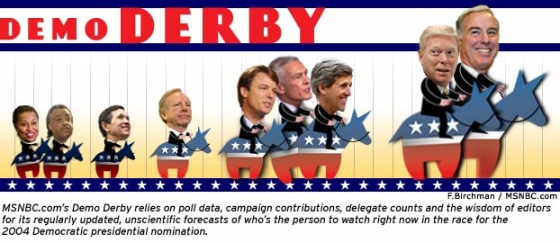The big words for this edition of Demo Derby are Gore, backlash and “bossism.” Howard Dean moves a bit ahead of Dick Gephardt on the strength of winning the endorsement of 2000 Democratic candidate Al Gore.
But Dean’s rivals argue that Democratic primary voters can’t be told to just fall into line and support Dean. After all, no ballots have yet been cast, so how can Dean be declared the winner? We can't gauge any backlash effect yet from the Gore endorsement, but we’re watching closely.
Gephardt stays very much in the game due to his own big endorsement this week from Rep. Jim Clyburn, South Carolina’s most powerful black politico.
Unlike Gore, who has retired from politics after losing his last race, Clyburn is very much an active politician -- elected six times in a row -- who has an extensive organization in a vitally important primary state.
Clyburn pushes Gephardt closer to a win in South Carolina’s Feb. 3 primary. Caution, though: North Carolina Sen. John Edwards is leading in the most recent South Carolina poll, with Gephardt and Gen. Wesley Clark close behind him.
And of course Gephardt would need to survive the Jan. 19 Iowa caucuses in order to get to South Carolina.
Although Gore’s ex-running mate, Sen. Joe Lieberman, sounded hurt by Gore’s support for Dean, why should anyone have been surprised by it?
"This is business, not personal," as Tom Hagen said. Gore wasn’t Lieberman’s bosom buddy, he was his short-term business partner. The partnership did not work out.
Gore knows that ever since 1980, the Democratic contender who raised the most money in the year prior to the primaries ended up winning the nomination. Dean has raised oodles more than any of the other contenders this year.
The Gore backlash was directed also at the news media.
In a Tuesday night debate, ABC News moderator Ted Koppel came close to mocking Rep. Dennis Kucinich, the Rev. Al Sharpton and former Sen. Carol Moseley Braun for raising so little campaign cash.
Kucinich moves up on the strength of his sheer feistiness in scrapping with Koppel over his question on Gore’s endorsement.
“To begin this kind of a forum with a question about an endorsement … trivializes the issues that are before us,” Kucinich told Koppel. “At this moment there are 130,000 troops in Iraq. I would like to hear you ask during this event, ‘What's the plan for getting out?’”
Just as Dean has been telling his audiences to "take back this party," Kucinich was telling voters to "take back this election" from Gore and Koppel (and, yes, from Demo Derby, too!) who have been declaring that Dean is likely to win the nomination.
Just to state Demo Derby’s official position: Based on polling, on interviews of likely voters, and on campaign money raised and spent, Dean appears likely -- but by no means certain -- to win the nomination.
Sharpton nudges up in the Demo Derby rankings, too, with his fighting words: "The Republicans shut us up four years ago. Al Gore -- no Democrat should shut us up today. Let the people decide on the nominee. Bossism shouldn't happen."
As for Lieberman, he gave his own spin to the Gore news, telling supporters in an e-mail that it was “a golden opportunity to crystallize the race into what we have always predicted it would be: a fight for the soul and future of the Democratic Party. … Gore's announcement may prove to be a defining moment in our campaign. We are seeing a huge new burst of energy on my behalf, as support and contributions pour in from all over the country in response to Gore's announcement.”
Lieberman promised to “continue fighting for the only endorsements that matter -- the voters'.”
Massachusetts Sen. John Kerry, running second in New Hampshire polling but losing ground to Dean since summer, opened an attack on the front-runner this week, pointing to ambiguous Dean statements on the Iraq war.
Even though Dean has campaigned as an opponent of the Iraq war, Kerry noted that in October of 2002, Dean supported a proposed resolution by Sens. Richard Lugar, R-Ind., and Joe Biden, D-Del., that would have authorized President Bush to attack Iraq for the purpose of preventing Saddam Hussein from developing and using weapons of mass destruction.
Dean was saying as late as Oct. 14, 2002, that he supported the Lugar-Biden approach, but Lugar himself had dropped the idea a week earlier after changes were made to the war resolution that Congress ultimately passed on Oct. 10 and 11. (Both Biden and Lugar voted for the resolution.)
Asked on Oct 14, 2002, whether he supported the resolution that Congress had passed, Dean told a Vermont reporter, “I haven't had a chance to read the resolution."
